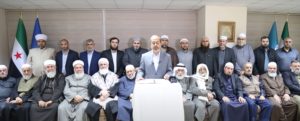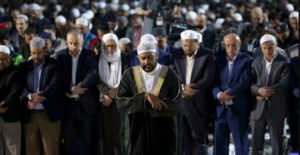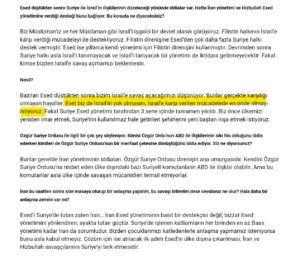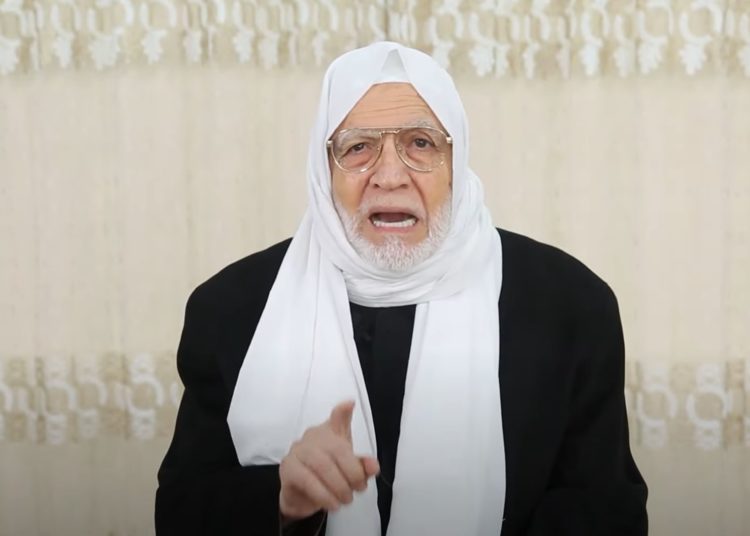Abdullah Bozkurt/Stockholm
Sheikh Osama al-Rifai, the newly elected grand mufti of Syria and a die-hard supporter of the Turkish president, established a foundation in Turkey to run schools ranging from primary grades to university.
The authorization to set up the Şam Medeniyet Vakfı (Damascus Civilization Foundation, ŞMV) was granted by the Istanbul 9th Court of First Instance on February 3, 2022. The decision was publicized on February 22 by the General Directorate for Foundations, a government agency attached to the Culture and Tourism Ministry.
According to court papers, al-Rifai stated the purposes of the foundation as “to further the level of education for the general population” and “to open educational and teaching institutions at all levels from primary school to university.”
The establishment of the foundation means non-Turkish Islamist groups operating in Turkey, especially the Muslim Brotherhood network, were given permission to establish various educational institutions to further their Islamist ideology.
The announcement in the Turkish government’s official registry on the establishment of the Şam Medeniyet Vakfı (Damascus Civilization Foundation):
Al-Rifai, whose background is rooted in the Sufi “Zayd Group” established by his father Abdul Karim Al-Rifai, is very much influenced by and connected to the Muslim Brotherhood in Syria. He moved to Turkey in June 2012, shortly after the start of the Syrian civil war in 2011, threw his weight behind the opposition in Syria and started working with the government of President Recep Tayyip Erdoğan.
He gathered a group of Syrian Islamist scholars as well as others to revive the League of Scholars of the Levant (LSL), a secretive organization that was established in 1937 and remained underground until 2011. The Erdoğan government installed him as head of the Istanbul-based Syrian Islamic Council (SIC) in 2014 as part of Turkey’s initiative to establish an umbrella group that would bring many religious figures together to support and legitimize the opposition against the Bashar al-Assad government.
When the Assad government abolished the post of grand mufti last year, al-Rifai was elected by the opposition to be the new grand mufti in November 2021. The Muslim Brotherhood welcomed al-Rifai’s new position.
Al-Rifai and his associates in the Brotherhood and Sufi networks have been working both in Turkey and in territories under the control of Turkish armed forces in the north of Syria in promoting religious discourse in line with the political Islamist discourse of the Erdoğan government.

Sheikh Osama al-Rifai was elected by the opposition to be the new grand mufti in November 2021. The Muslim Brotherhood welcomed al-Rifai’s new position.
The establishment of the ŞMV this year with the explicit purpose of running schools from primary grades to university means new tasks provided to the Al-Rifai group by President Erdoğan, who has been trying to transform Turkey’s educational system to raise a generation of Islamists. Not only the Turkish government but also Qatar and wealthy Islamists businesspeople around the world with ties to the Brotherhood have been pouring funds into Islamist groups in Turkey.
President Erdoğan has been trying to shore up the Muslim Brotherhood network across the Middle East and North Africa since the Arab revolutions started in 2011, with some limited success in Syria, Yemen, Tunisia, Libya and Egypt. Erdoğan’s project has been dealt setbacks in many countries since then.
Although Erdoğan has reached out to Egypt, Saudi Arabia and the United Arab Emirates in recent years in a bid to normalize ties with those countries and help Turkey break its growing isolation, he has not really given up on his support for the Brotherhood network. Egypt’s Islamists in Turkey were told to tone down their criticism of Egypt on TV channels they operate out of Istanbul, but the substantial support they receive from the Erdoğan government has continued.

Both Egypt and Saudi Arabia have so far remained unconvinced on Turkey’s overtures even after Abu Dhabi reached out to Turkey in a move to reduce tensions and manage a confrontation with Turkey in Libya through their respective proxies.
In the meantime, al-Rifai has been freely moving back and forth between Turkey and Turkish-army controlled areas in Syria, giving sermons and trying to consolidate various Islamist groups there. In one of his recent sermons he sparked controversy when he accused the UN, international NGOs and the West in general of corrupting Syrian women and young people. His talking points echoed the general sentiment expressed by the Turkish political Islamists who fund his operations.
“There is a pronounced crowd of colonialists, infidels and misled people in the West, and they mobilized armies to divert young people from their values and their upbringing. Did you know that there are women from our own country who come as recruits from the UN and other infidel organizations to spread ideas of what they call women’s emancipation and so-called gender under the slogan of empowering women and granting them freedom? … These are recruits from the West who are here to corrupt our women,” al-Rifai said in a sermon delivered at the Azaz Grand Mosque in August 2021.
The cleric publicly endorsed the government of President Erdoğan and asked his followers to support and pray for the Islamist regime in Turkey.
In 2016, he said Turkey is very valuable to them as it was on the side of the oppressed. He described attacks on Turkey as attacks on Islam and all Muslims and called on all Muslim governments and populations around the world to lend support to the Erdoğan regime.
The cleric joined a campaign in 2017 to convert Hagia Sophia, a historic monument of the Eastern Orthodox Church, into a mosque, which finally took place in 2020 by means of a decree issued by the president. In one of several interviews, he said he hoped to import the study network clustered around the mosques in Syria to Turkey and help raise young clerics. In another interview, he expressed his wish to see Israel wiped out.













